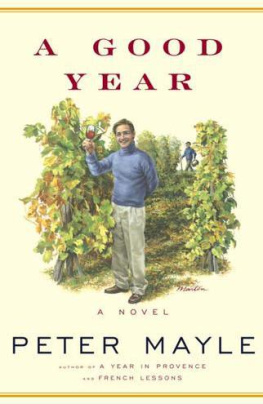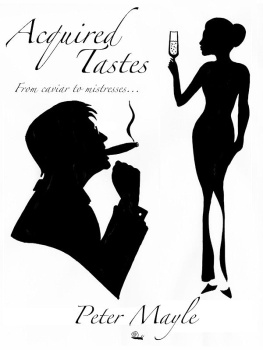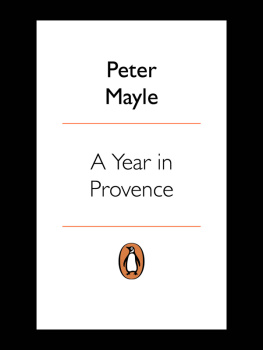Peter Mayle - A Year in Provence
Here you can read online Peter Mayle - A Year in Provence full text of the book (entire story) in english for free. Download pdf and epub, get meaning, cover and reviews about this ebook. year: 1991, publisher: Vintage Books, genre: Non-fiction. Description of the work, (preface) as well as reviews are available. Best literature library LitArk.com created for fans of good reading and offers a wide selection of genres:
Romance novel
Science fiction
Adventure
Detective
Science
History
Home and family
Prose
Art
Politics
Computer
Non-fiction
Religion
Business
Children
Humor
Choose a favorite category and find really read worthwhile books. Enjoy immersion in the world of imagination, feel the emotions of the characters or learn something new for yourself, make an fascinating discovery.

- Book:A Year in Provence
- Author:
- Publisher:Vintage Books
- Genre:
- Year:1991
- Rating:4 / 5
- Favourites:Add to favourites
- Your mark:
- 80
- 1
- 2
- 3
- 4
- 5
A Year in Provence: summary, description and annotation
We offer to read an annotation, description, summary or preface (depends on what the author of the book "A Year in Provence" wrote himself). If you haven't found the necessary information about the book — write in the comments, we will try to find it.
A Year in Provence — read online for free the complete book (whole text) full work
Below is the text of the book, divided by pages. System saving the place of the last page read, allows you to conveniently read the book "A Year in Provence" online for free, without having to search again every time where you left off. Put a bookmark, and you can go to the page where you finished reading at any time.
Font size:
Interval:
Bookmark:
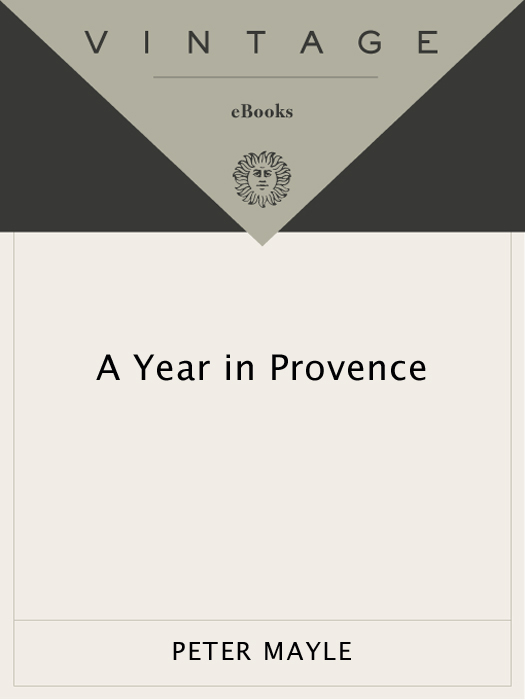
BOOKS BY PETER MAYLE
Encore Provence
Chasing Czanne
Anything Considered
A Dogs Life
Hotel Pastis
Toujours Provence
A Year in Provence
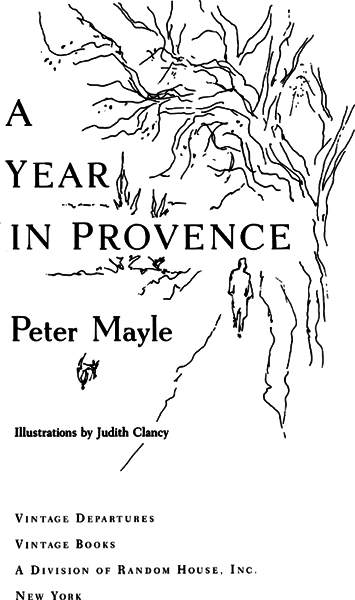
T O J ENNIE ,
with love and thanks
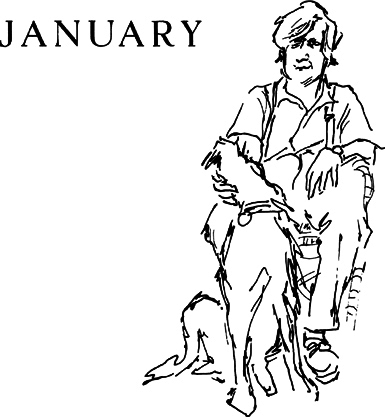
T HE YEAR BEGAN with lunch.
We have always found that New Years Eve, with its eleventh-hour excesses and doomed resolutions, is a dismal occasion for all the forced jollity and midnight toasts and kisses. And so, when we heard that over in the village of Lacoste, a few miles away, the proprietor of Le Simiane was offering a six-course lunch with pink champagne to his amiable clientele, it seemed like a much more cheerful way to start the next twelve months.
By 12:30 the little stone-walled restaurant was full. There were some serious stomachs to be seenentire families with the embonpoint that comes from spending two or three diligent hours every day at the table, eyes down and conversation postponed in the observance of Frances favorite ritual. The proprietor of the restaurant, a man who had somehow perfected the art of hovering despite his considerable size, was dressed for the day in a velvet smoking jacket and bow tie. His mustache, sleek with pomade, quivered with enthusiasm as he rhapsodized over the menu: foie gras, lobster mousse, beef en crote, salads dressed in virgin oil, hand-picked cheeses, desserts of a miraculous lightness, digestifs. It was a gastronomic aria which he performed at each table, kissing the tips of his fingers so often that he must have blistered his lips.
The final bon apptit died away and a companionable near-silence descended on the restaurant as the food received its due attention. While we ate, my wife and I thought of previous New Years Days, most of them spent under impenetrable cloud in England. It was hard to associate the sunshine and dense blue sky outside with the first of January but, as everyone kept telling us, it was quite normal. After all, we were in Provence.
We had been here often before as tourists, desperate for our annual ration of two or three weeks of true heat and sharp light. Always when we left, with peeling noses and regret, we promised ourselves that one day we would live here. We had talked about it during the long gray winters and the damp green summers, looked with an addicts longing at photographs of village markets and vineyards, dreamed of being woken up by the sun slanting through the bedroom window. And now, somewhat to our surprise, we had done it. We had committed ourselves. We had bought a house, taken French lessons, said our good-byes, shipped over our two dogs, and become foreigners.
In the end, it had happened quicklyalmost impulsivelybecause of the house. We saw it one afternoon and had mentally moved in by dinner.
It was set above the country road that runs between the two medieval hill villages of Mnerbes and Bonnieux, at the end of a dirt track through cherry trees and vines. It was a mas, or farmhouse, built from local stone which two hundred years of wind and sun had weathered to a color somewhere between pale honey and pale gray. It had started life in the eighteenth century as one room and, in the haphazard manner of agricultural buildings, had spread to accommodate children, grandmothers, goats, and farm implements until it had become an irregular three-story house. Everything about it was solid. The spiral staircase which rose from the wine cave to the top floor was cut from massive slabs of stone. The walls, some of them a meter thick, were built to keep out the winds of the Mistral which, they say, can blow the ears off a donkey. Attached to the back of the house was an enclosed courtyard, and beyond that a bleached white stone swimming pool. There were three wells, there were established shade trees and slim green cypresses, hedges of rosemary, a giant almond tree. In the afternoon sun, with the wooden shutters half-closed like sleepy eyelids, it was irresistible.
It was also immune, as much as any house could be, from the creeping horrors of property development. The French have a weakness for erecting jolies villas wherever building regulations permit, and sometimes where they dont, particularly in areas of hitherto unspoiled and beautiful countryside. We had seen them in a ghastly rash around the old market town of Apt, boxes made from that special kind of livid pink cement which remains livid no matter what the weather may throw at it. Very few areas of rural France are safe unless they have been officially protected, and one of the great attractions of this house was that it sat within the boundaries of a national park, sacred to the French heritage and out of bounds to concrete mixers.
The Lubron Mountains rise up immediately behind the house to a high point of nearly 3,500 feet and run in deep folds for about forty miles from west to east. Cedars and pines and scrub oak keep them perpetually green and provide cover for boar, rabbits, and game birds. Wild flowers, thyme, lavender, and mushrooms grow between the rocks and under the trees, and from the summit on a clear day the view is of the Basses-Alpes on one side and the Mediterranean on the other. For most of the year, it is possible to walk for eight or nine hours without seeing a car or a human being. It is a 247,000-acre extension of the back garden, a paradise for the dogs and a permanent barricade against assault from the rear by unforeseen neighbors.
Neighbors, we have found, take on an importance in the country that they dont begin to have in cities. You can live for years in an apartment in London or New York and barely speak to the people who live six inches away from you on the other side of a wall. In the country, separated from the next house though you may be by hundreds of yards, your neighbors are part of your life, and you are part of theirs. If you happen to be foreign and therefore slightly exotic, you are inspected with more than usual interest. And if, in addition, you inherit a long-standing and delicate agricultural arrangement, you are quickly made aware that your attitudes and decisions have a direct effect on another familys well-being.
We had been introduced to our new neighbors by the couple from whom we bought the house, over a five-hour dinner marked by a tremendous goodwill on all sides and an almost total lack of comprehension on our part. The language spoken was French, but it was not the French we had studied in textbooks and heard on cassettes; it was a rich, soupy patois, emanating from somewhere at the back of the throat and passing through a scrambling process in the nasal passages before coming out as speech. Half-familiar sounds could be dimly recognized as words through the swirls and eddies of Provenal: demain became demang, vin became vang, maison became mesong. That by itself would not have been a problem had the words been spoken at normal conversational speed and without further embroidery, but they were delivered like bullets from a machine gun, often with an extra vowel tacked on to the end for good luck. Thus an offer of more breadpage-one stuff in French for beginnersemerged as a single twanging question. Encoredupanga
Font size:
Interval:
Bookmark:
Similar books «A Year in Provence»
Look at similar books to A Year in Provence. We have selected literature similar in name and meaning in the hope of providing readers with more options to find new, interesting, not yet read works.
Discussion, reviews of the book A Year in Provence and just readers' own opinions. Leave your comments, write what you think about the work, its meaning or the main characters. Specify what exactly you liked and what you didn't like, and why you think so.

